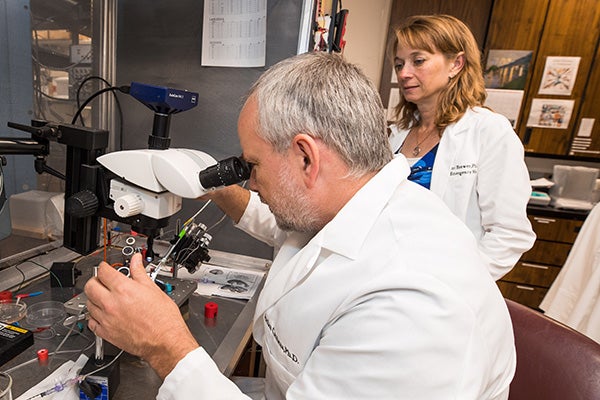INNOVATION HUB
ECU joins partnership to foster innovation in NC
Thanks in part to university research, North Carolina has great potential for research and development but trails other states in commercializing that research, according to NCInnovation, a nonprofit formed to foster innovation throughout the state.
East Carolina University will play a leading role in the effort as one of four UNC System institutions serving as regional innovation hubs, and ECU Chancellor Philip Rogers has been named a member of the nonprofit’s board of directors. Western Carolina University, UNC Charlotte and N.C. A&T will serve as the other regional hubs. Their chancellors, along with UNC System President Peter Hans, also serve on the board.
“NCInnovation has partnered with ECU to help orient applied research toward industry needs, and then support researchers in commercializing the results of their work,” said ECU alumnus Kelly King, NCInnovation board chair. “Chancellor Rogers shares our bold vision to center economic development around universities, especially in more rural parts of the state. I’m proud to call him a partner.”

Stefan Clemens and Kori Brewer have developed a combination therapy for spinal cord injuries that provides pain relief and ultimately reduces the likelihood of unwanted opioid side effects. (ECU photo by Cliff Hollis)
NCInnovation will work to create links between the university system and private enterprise, providing access to funding, experts with experience launching new ventures, technical equipment and other resources, said Sharon Paynter, acting chief research and engagement officer at ECU.
“It’s a comprehensive approach to moving research outside of the university system and into communities across the state,” she said. “The power of research is to be able to take it from inside an academic setting to apply it to real-world problems by creating companies and jobs.”
NCInnovation is working to address key challenges to the commercialization of research ideas, including a lack of resources and mentors for researchers and entrepreneurs, especially outside the state’s major cities; insufficient funding for commercialization efforts; and a lack of collaboration among academic, industrial and capital networks.
“The innovation concept is that to be competitive with other states, North Carolina is going to have to invest in the translation of research into new entrepreneurial activities,” Rogers said. “This partnership will bolster ongoing efforts at ECU to leverage new ideas and technologies developed at the university to create lasting positive change in our region.”
NCInnovation has raised more than $23 million from donors, and the State of North Carolina is interested in heavily investing in this initiative. Legislative funding is pending the state’s budget reconciliation process, but the governor and both legislative branches have included funding in their proposed budgets.
Paynter said NCInnovation will allow universities to leverage new technologies sooner, surrounding researchers with the right people at the right time to support early-stage technology development. This approach compresses the startup phase, she said, by making business and intellectual property experts, access to capital and other resources available sooner and in ways that startup companies can afford.
“ECU faculty have been doing research in lots of areas that have the potential to be impactful for eastern North Carolina, including new treatments, drugs and therapeutics in the health care industry, renewable energy research, and sensor and networking technologies,” she said. “NCInnovation gives us a way to support and expand those ideas by building the jobs and infrastructure to share that technology with communities around the world.”
By building a regional ecosystem focused on innovation and development in partnership with NCInnovation, ECU continues to pursue its mission of regional transformation.
